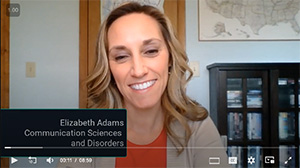Academic Integrity
The UVM Center for Student Conduct offers helpful resources about academic integrity in Brightspace for faculty to share with students. These resources are organized into module topics such as plagiarism, collusion, and cheating. To access this course, log into Brightspace and click Discover. Search for “academic integrity” and then click “enroll in course.” (If the search yield no results, it means you’re already in this course.)
To receive zip files of these modules to import to your own courses, contact Deanna Garrett-Ostermiller, Assistant Director, Center for Student Conduct (dgarrett@uvm.edu, 802-656-4360). (See the knowledge base article for instructions on importing course components.)
In addition, they maintain a SharePoint site for Academic Integrity that has more information about the academic integrity process, academic integrity resources for faculty, resources about ChatGPT & GenAI, and links to videos for students.
 VIDEO: CTL faculty associates share ideas for encouraging academic integrity in online or remote assessments
VIDEO: CTL faculty associates share ideas for encouraging academic integrity in online or remote assessmentsEssential to student success are ethical choices that reflect responsibility and integrity. One of the values listed in UVM’s Our Common Ground:
Other steps to make expectations more clear
- Prominently link to UVM’s Code of Academic Integrity in your course syllabi, (https://www.uvm.edu/sites/default/files/UVM-Policies/policies/acadintegrity.pdf) and follow this with a few words in class to underscore the importance of these rules and how they will be enforced in your course. For example, exactly what is prohibited by a term like ‘collusion’ may not be obvious given that some kinds of student-to-student sharing of ideas is typically encouraged.
- Give clear reminders – Give students a reminder just before an exams or high-stakes assignments about UVM’s Code of Academic Integrity, and the consequences of violating it by engaging in plagiarism, fabrication, collusion, or cheating, may help to deter cheating behaviors.
- Review definition of cheating and provide resources – International students may not be familiar with the kinds of learning support available on campus or may be uncertain when it is appropriate or permitted to use them. Rules regarding academic integrity can vary from country to country as can the strictness with which they are enforced. It is helpful to be explicit about what constitutes plagiarism or cheating and to let students know about the campus learning support services available to them and specifically direct students to use them where relevant.
- Review this tip sheet from UVM Writing in the Disciplines Plagiarism, Source Use, and Writing Ethics (PDF)
- Be explicit about citation style – Given the great variation in academic citation expectations across disciplines, from country to country, and even from one type of assignment to another, it is helpful to be clear regarding your expectations (and the specific citation style you require, where relevant).
- Authentic assessments – When planning your course(s), consider moving to authentic assessments (indiana.edu). Authentic assessments engage students’ intrinsic motivation by connecting to personal interests, real-world application, and current events. Research shows that when students are personally interested in their learning, they are much less likely to cheat. Additionally, authentic assessments are often specific to a time, place, person, and or event, which means they are less likely to be able to be copied from previous semesters or purchased from online sources.
- Alternatives to Traditional Tests
Resources
- Authentic Assessment
- UVM Policy: Code of Academic Integrity (PDF)
- The Center for Student Conduct
- Tip sheet from UVM Writing in the Disciplines Plagiarism, Source Use, and Writing Ethics [PDF]
- CTL faculty associates share ideas for encouraging academic integrity in remote assessments
